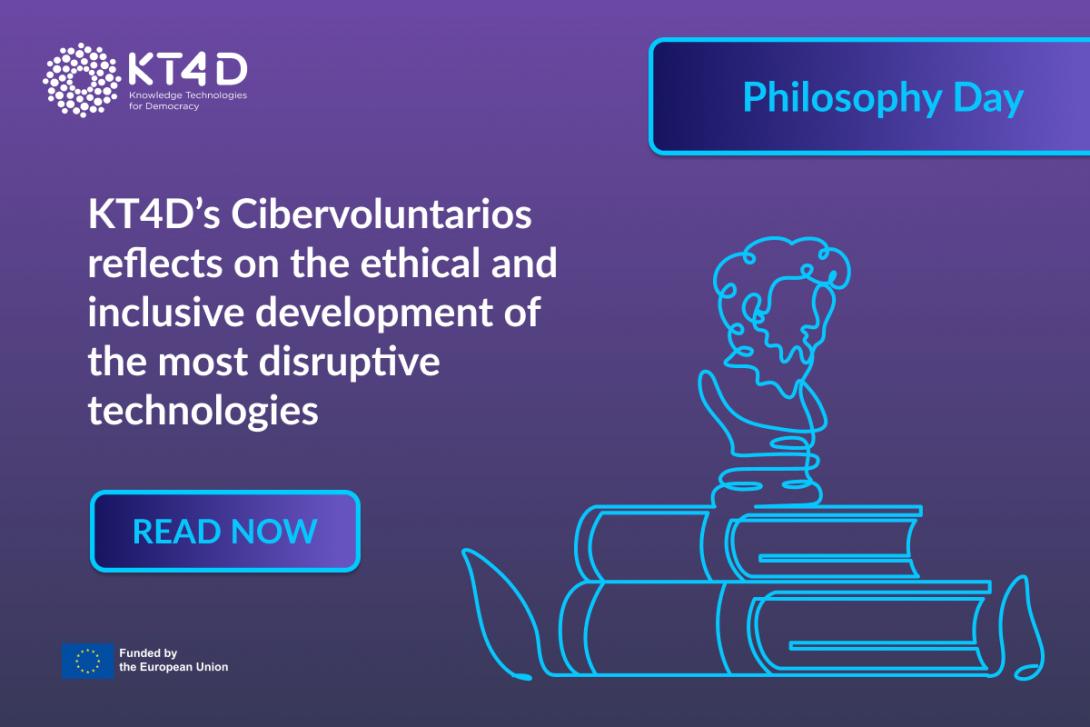KT4D’s Cibervoluntarios reflects on the ethical and inclusive development of the most disruptive technologies
13, January, 2025

Have you ever thought about how artificial intelligence (AI) and big data are transforming our daily lives? This was the central theme of the event held on 21 November 2024 at Casa de Vacas in Madrid, on the occasion of Philosophy Day. On this occasion KT4D’s partners - Fundación Cibervoluntarios - promoted the debate on the ethical and inclusive development of the most disruptive technologies, seeking to benefit all people, especially the most vulnerable. The focus was on the relationship between philosophy, democracy and technology, and how to move towards a more ethical development of new technologies.
What do philosophy and technology have in common: how do philosophy and democracy converge in the age of artificial intelligence and big data?
Although at first they may seem worlds apart, in reality, philosophy has a lot to contribute to the ethical and inclusive development of artificial intelligence (AI) and big data. Drawing from the impact of literacy in Socrates’ Greece, Fundación Cibervoluntarios discussed the impact of digital literacy and ICT skills, in the moral advancement of modern democracies - taking into account potential disruptiveness of emerging technologies.
‘We need philosophy to understand technology’.
Octavio Barriuso, Fundación Cibervoluntarios
Philosophy Day was a perfect occasion to stop and reflect: are we using these technologies in an ethical way? Fundación Cibervoluntarios believes it is essential to promote reflection and debate on the ethical and inclusive development of the most disruptive technologies which often impact our lives in ways we may not even realize.
Technology at the service of society
Following the theme of the event, Fundación Cibervoluntarios presented two of its projects - KT4D and iDEM - in which it collaborates with other European partners and uses technology for the responsible development of democracy. Two members of the iDEM consortium - postdoctoral researcher Cristina Astier and researcher and professor José Luis Martí, from Pompeu Fabra University - were present. Together with two researchers from Fundación Cibervoluntarios, they presented the projects and led the reflection on inclusion in democratic processes.
‘In the future, some people will not be able to believe that we accepted as democratic institutions that are not’.
Jose Luis Martí, UPF.
On one hand, KT4D drives the development of ethical and responsible technologies to ensure that big data and AI are designed with a social purpose, not just a commercial one. From tools to combat hate speech, to apps that promote citizen participation, KT4D demonstrates how technologies can improve people's lives.
‘At KT4d we look for points of connection between physical and digital spaces, promoting a critical vision from which to make conscious use of Artificial Intelligence and big data tools’.
César García, Cibervoluntarios Foundation
On the other hand, iDEM is working on the simplification of official texts through AI, to include people with language barriers in democratic processes.
‘Many people would appreciate being able to better understand information and democratic processes’.
Cristina Astier, UPF.
Philosophy Day at Casa de Vacas
This event was held in collaboration with UNESCO and the Getafe-Madrid Association for UNESCO. In collaboration with the Madrid City Council, this open event sought to bring the debate on the ethics of disruptive technologies to all interested people. The debate opened with a question to the audience from Cristina Astier, postdoctoral researcher at iDEM at UPF:
‘Would you prefer to be judged by an artificial intelligence or a human judge?’
This discussion concluded with a message that guided the rest of the meeting: the inclusion of all types of people in the development of technologies is vital for an ethical digital evolution that centralises the well-being of the population. In addition, the entire meeting also featured the poetic action of Sonia Aldama. Fundación Cibervoluntarios stresses the importance of digital literacy, that is, knowing how to use disruptive technologies ethically and to our advantage, so that progress translates into meaningful improvements in the quality of life of all people.